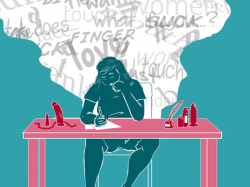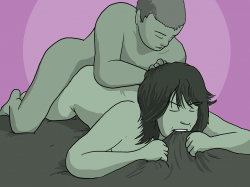All Posts – Page 348

On the Doxy massager: best wand toy ever
About ten years ago, my boyfriend bought me my first ever sex toy. We spent ages in the shop choosing, then eventually came home with a rabbit-type thing that the sales assistant recommended because ‘you’ll regret it if you go for the smaller one.’ That afternoon the boy hand-fucked me with a growing sense of awestruck wonder as I went from ‘oh that’s odd’ to ‘mmm fucking hell’ through to ‘DON’T STOP DON’T STOP OR I SWEAR I WILL EAT MY OWN TONGUE.’

On why learning is hot
I’m the worst student. When I’m not cocking up the task you’ve set me, or getting stroppy because I don’t understand, I’m struggling to concentrate because – God damn my juvenile brain – there’s a teacher, and he’s got such sexy hands and commanding presence and I want to know what it would be like for him to put me over the desk and spank me.
Don’t get me wrong – I listen, I do. But I have such strong connections with school and arousal that there’s an unavoidable physical reaction I get that prevents me from always being the model student.
Teenage kicks right through maths class
Most people have a teacher they used to crush on. I’ve told you about mine before, and the feelings I had for him sit heavily in the back of my mind when I’m in any situation that involves sitting down and listening to a speaker.
But there’s more to the learning/sex association than a hot teacher and my own fluttering eyelashes – school itself was deeply hot.
I was a nerdy child. The one with greasy hair and crap glasses, who sat aching on the sidelines at the school disco, desperate for a boy to rub herself against but never quite cool enough to be asked. Interactions I did have with boys were usually furtive. Geeky guys drew the line at being associated with me and I, keen to ape the mysterious heirarchy of popularity, didn’t want to be too publicly associated with them for similarly misguided childish reasons.
So: furtive secrecy all the way.
A touch under the desk. An elbow brushing my chest when a boy leant across to get a pen. A five-minute grope behind the sheds on the playing fields until the bell rang for the end of lunchtime and I groaned and nearly melted into a puddle of my own frustrated angst.
Maths class was the best. I sat sandwiched between two friends, who used my desperation for in-class touching as an outlet for their own rampaging hormonal curiosity. We’d flirt. We’d touch. We’d scrawl notes to each other in the back of workbooks:
“I had a wank about you last night.”
And all the time knowledge was being hurled at me. Equations, formulae, words, techniques, answers. I wrote it down. I tried to focus. And I tried to wrench my brain away from the fact that oh God his hand was on my thigh and his fingers were so close and if I just shift a little bit to the right he’ll feel the wetness seeping through my knickers.
The hotness of learning doesn’t go away
I’m not young any more, and I can make it through a conference call or a powerpoint presentation without dripping concentrated lust through the crotch of my jeans. But the association, now made, cannot be broken. I’m the one sitting at the back noting down words and feeling hot with the physical memory of classes in which the boys deigned to touch me. The rigid stiffness of sitting still gives me an awareness of all of my muscles, my limbs, the rise and fall of my chest, the pulsing throb of my heartbeat kicking against the seams of my clothes.
It can’t just be me – it’s definitely not just me, right? The combination of youthful memories and adult fantasies means that when I’m at the back of the room I’m more vulnerable to instinctive arousal than ever. I’ll take notes, listen, and ask pertinent questions, but when I shift in my seat it’s not always because I’m uncomfortable.
Eroticon 2014
As you might have guessed, this weekend I was at Eroticon – a spectacular sex writing conference. I kept a bit quiet about going because I don’t like to broadcast where I am at any given point, but this post won’t go live until I’ve left. Alongside writhing in exquisite horniness for two solid days, I learned many fantastic things from some truly brilliant and lovely people. I’m sure I will miss some people off the list because I am fallible and useless and editing this on my phone – but thank you to everyone I met for being kind and putting up with my anxious mumbling.
Ruby Goodnight, Cara Sutra, Emily Dubberley and Mia More – all incredibly lovely people who taught me many things about online writing, press, and working the machine.
Molly and DomSigns – they are like the Sid + Nancy of sex blogging. Follow both of them, and if you get to meet them one day then you are incredibly lucky – try not to be as inarticulate and starstruck as I was.
Pandora Blake, Myles Jackman and Zak Jane Keir – they talked very wisely about censorship, and taught me things that scared the crap out of me. Zak wins the award for ‘quote of the weekend’: “If censorship is the answer, then it was a fucking stupid question.”
Victoria Blisse, KD Grace and London Faerie – sometimes you need to step outside what you know, and these people all taught me really interesting things about perceptions of sex outside my own limited experience and opinions.
The lovely people at Belle de Soir and Doxy who gave me one of these incredibly powerful fuckwands. I have never had a sex toy that comes this close to being an actual power tool, so expect a post soon in which I describe, in excessive detail, the terrifyingly awesome things I expect it’ll do to my cunt.
The excellent and hilarious HarperElliot and Gryphon taught me how to read porn out loud, so if you’re interested in hearing a blog post rather than reading it, let me know and I’ll try to record something using their excellent advice.
And a final, most heartfelt thank you to the awesome Ruby, who is the hard work and exceptional organisation behind Eroticon. You are spectacular, and thank you so much for having me.

Someone else’s story: Giving up on filthy sex
Wise people are discussing sex addiction at the moment. And by ‘wise people’ I mean mostly Brooke Magnanti, who’s written some interesting stuff about it in the Telegraph as well as her excellent book ‘The Sex Myth‘. I’m nervous about applying the label ‘addiction’, particularly to something I enjoy immensely and crave absolutely, but that also – despite my occasional fuck-ups – significantly improves my life. Brooke nails many of my concerns about the sex addiction industry, and rest assured that no matter what you think your problem with sex is, you can guarantee there’ll be someone happy to take your money for a ‘cure’.
However, the fact that there are dubious diagnoses of ‘porn addiction’ and much hand-wringing about ‘sex-addicted’ celebrities, that doesn’t negate the very real problems that some people have with sex – if something is negatively affecting your life, then making the decision to take control of it is probably a wise one. This week’s guest post, which I found hilarious as well as touching, comes from a guy who is as filthy as I am (and most likely even filthier) but for whom sex isn’t the magical wonderland he really wants. In his own excellent (and anonymous) words, I’ll let him explain…
Giving up on filthy sex
It’s funny how things turn out. One minute you’re married, living the Guardian colour supplement dream, and the next you’re listening to the fire alarm go off at 11am when you’re in the middle of your first all male threesome. While your febrile imagination runs through the many and varied ways in which your immediate future can best humiliate you, the voice in your head is simply saying, ‘what the fuck? How the hell did I end up living in a bachelor pad having two cocks in my mouth for elevenses?’ Then you remember that it’s Thursday, fire alarm test day. The looks of horror subside, and hungry mouths get to work once more …
That’s right, I am a man-whore, a slut; call me what you will. Over the past year, for example, I think I fucked as many women as I did in the twenty years following the greatly anticlimactic event that was the mislaying of my virginity. I’ve had sex with several men: both the sensual and louche kind and the on your knees from the moment the front door is shut to the moment they cum in your mouth kind. I’ve had threesomes, foursomes and fivesomes, been to orgies, parties and swinging-friendly amenities. I’ve licked my partner’s pussy while another guy squirted his cum down her throat, watched her get fucked by two men, fucked her while a guy wanked into my open mouth, letting the cum drip into hers, fucked a guy while he was fucking her … Sometimes I think back and almost shock myself, and yet it started with a kiss.
To be brutally honest, I love it. I love to see the naked greed in a girl’s eyes, to see the look in a guy’s as my partner takes his cock in her mouth, I love it all. Which makes it all the more strange that I’m giving it up.
Why give up on filthy sex?
Not long after the kiss, I found myself putting a collar on the actual girl next door in a B&BDSM in the sticks. The next week I was at a party. I was introduced to a Dr Jones, simply because we were the only two Drs there. After about ten minutes I said, simply, ‘shall we fuck?’ The only query was her place or mine. It was a while before I realised that I had been caught in a perfect sexual storm.
I was single, clever, charming, handsome, fit, with a disposable income and a newly acquired (non-transmittable) disease which had two neatly intersecting outcomes – a carpe diem mentality and a pharmaceutically-induced sexual compulsion. I was suddenly devastatingly successful, to the point that when I found a properly filthy girl, the kind who would make me fuck her before she went to work and would then spend the day sending me texts such as ‘In a meeting. Can feel you leaking out of my cunt. Hot’, I simply carried on. I cultivated a rolling harem of between four and eight girls on top (sometimes literally) of my partner. Now I’m living the dream, right?
Did I just say I was going straight? It amazes me, too. I’ve had two proper play partners, both sexy and both filthy. The first was a proper partner. I fucked that up because I couldn’t control my compulsion. The second was achingly sexy, fabulously filthy, but I just didn’t care, so while it was great fun, the whole game started to lose its appeal. We still had outrageously good sex, but came to need others. We’d arrange meets and people wouldn’t show. Fakers and dreamers, most of them. And then we’d have one of those meets when it seemed like everyone was climbing over me to get at her. Naturally, our open relationship was extremely one-sided – I got all the action.
The compulsion meant that when the hunger hit, it was like a drug, I simply had to get something, anything. Sport fucking is what I once heard it called. It became mechanical. I started counting.
This is what compulsion does to you. You acquire, you collect: you never connect.
In the middle of the craziness I connected with someone who couldn’t cope with the sharing. She tried, taking some guy home after a party I wasn’t at, but regretted it. Strangely, I found myself a little jealous. So I decided to try, to see whether the finest vanilla can trump the kid in a candy store draw of tutti frutti. To see whether the taste of perversion, once experienced, is craved forevermore.
Wish me luck.
If you enjoyed that post, check out some more guest contributions, and let the author know what you think in the comments!

On short sex stories
Hotness doesn’t always come in movie-length bursts. Short sex stories and tiny elements of the bigger picture are usually the things that kick off a more solid fantasy. If you’ve ever spent the morning after a great night being ambushed by images and snapshots of the sex you had just hours before, you’ll know what I mean. Filthy memories and stories pop up in small bits – like the sliver of a song that goes round in my head, sometimes I’ll remember just one tiny element of a fuck that’ll leave me frustrated and wet for the rest of the day.
That’s why, when BeingBlackSilk posted a miniature erotic short story earlier this week, I nearly cried with delight. She wrote a tiny tale of filth on a post-it note, and by limiting the tale to 55 words managed to capture exactly that horny kick that I get from flash-memories of times gone by. This idea isn’t just up my street, it’s straight up my garden path, halfway in the door and fucking me naked in the hallway.
So here’s mine – a tiny story from a long time ago.
You know where
I want to leave a plaque: “It was here – the first time I almost…” Next to the fallen tree, hidden from view of the road by broken fencing, the place I first got wet. Where your trembling hands squeezed me and you gasped as you felt my nipples grow hard. Where I panted and thrilled at the feeling of slick lust dripping into my knickers. Where I gripped your tight, twitching dick until you were wet with pleasure too. That place where – half a lifetime ago – I was far too shy to fuck you.
Plenty more sex stories where that came from…
If you’d like some more substantial sex stories, check out the filthy stories section on this blog, or head to the audio porn hub to hear sexy stories read aloud…

Punishment fucking: fuck me like I’m in trouble
The best thing about getting fucked like you’re in trouble is that to get out of trouble, you have to do exactly what you’re told. Here’s a story about punishment fucking, written when I was incredibly horny for exactly this kind of fuck…
